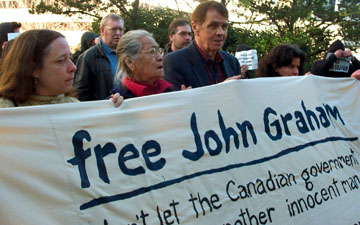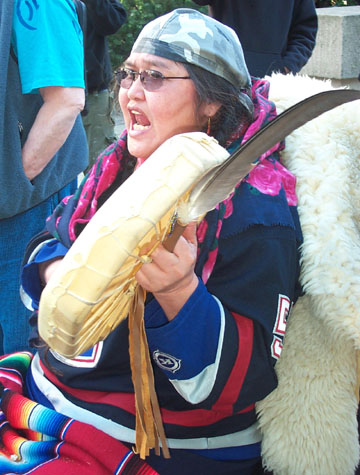
AMERICAN INDIAN MOVEMENT GRAND GOVERNING COUNCIL
MINISTRY FOR INFORMATION
November 8, 2005 A judge extended John Graham's bail to next June 23, 2006 as he fights extradition to the United States. The British Columbia Supreme Court last February ordered Graham sent to the United States to stand trial for the killing of Anna Mae Pictou Aquash. The extradition needs the federal justice minister's signature to go ahead. John's lawyer Terry LaLiberte is preparing an appeal that will include a constitutional challenge of Extradition Act ammendments that put less onus on countries to provide evidence to back their requests. Information posted by Matthew Lien, John Graham Defense Committee: Monday, February 21, 2005 John Graham returned to court today for the final decision of B.C. Supreme Court Justice Bennett, with respect to John's extradition. After issuing critical words to the Crown (representing the U.S.) regarding the weaknesses and inadequacies of the case against John, she ultimately decided she could not rule against the extradition request, relying largely on the hearsay testimony of John Trudell when making her decision. The official order will not be made until March 2 at 9:00 AM. At that time, John will be remanded briefly into custody -- most likely for two or three hours -- while his lawyers file for his appeal, after which John will remain free to help prepare his appeal. The courtroom was filled with supporters who shed tears and embraced each other when the judge announced her decision. Following the judgment, chanting could be heard from supporters gathered outside, protesting John's extradition and carrying banners which read, "Free John Graham" and "Don't let the Canadian government extradite another innocent man."
While today's decision is disappointing news, we have already recognized the judge's limited powers to oppose an extradition request by the U.S. In anticipation of this decision, these hearings have been very helpful for preparing the key arguments for appeal. Anyone who has paid attention to these proceedings has seen the sloppy and suspicious evidence provided by the U.S., which includes a dead witness who was certified as available to testify; the promise of testimony which is entirely contradicted in that witness's previous Grand Jury testimony; and an affidavit from the only alleged eyewitness declaring his refusal to testify, while asserting he was coerced by investigators -- a familiar experience in the related history of fraudulent FBI affidavits. An affidavit was also sworn by Leonard Peltier just a few weeks ago, describing how he was promised his freedom in return for providing false testimony against John. These hearings have also helped to inform and educate more people about the shameful and shoddy case against John Graham. Where a concern may have existed in the hearts of many regarding the ability for an Indigenous man to receive a fair trial in South Dakota, there is now little doubt that the case against John is false and fraudulent. The U.S. government's concern over the errors and weaknesses revealed in their case may be evident in the eleventh-hour change of the Crown prosecutor. A new prosecutor was appointed last week to represent the U.S. in the coming proceedings. Those of us seeking truth and justice in this matter view this case and the current extradition process as a clear continuation of the U.S. government's harassment and abuse of Native Americans. On the positive side, we also view this process as a powerful opportunity to raise awareness about the actions of the FBI, which are directly related to the death of Anna Mae Aquash and scores of Native Americans, and the wrongful imprisonment of Leonard Peltier.
In preparation for the struggle ahead, we are planning two campaigns: - One campaign is a request for letters to the editors of your local newspapers. Keeping our concern for truth and justice in the public eye is extremely important. We must let the people and the government of Canada know our opinions about this case, and the reasons for concern as it relates to John Graham and Canada's very sovereignty. - The other campaign is a call for letters to Canada's Justice Minister Irwin Cotler. The final decision on whether John is sent to the U.S. rests with Minister Cotler. Your letters will be very important. We will be preparing outlines for these two campaigns soon, and will include key points for your letters. Wednesday, February 2, 2005 John's defence attorneys submitted their final arguments today, and Supreme Court Justice Elizabeth Bennett announced she would deliver her final decision on Monday, February 21. In closing, John's attorney Terry LaLiberte discussed two points: one, that the certified evidence has been shown to be unreliable, and two, that the U.S. has not established the identification of John Graham as the perpetrator of the murder of Anna Mae Aquash. Mr. LaLiberte said the certified evidence of identification is "full of holes" in describing the person the U.S. is looking for, and does not match the booking sheet from John's arrest in Vancouver. The U.S. information as certified by U.S. Attorney Robert Mandel, states that they are looking for a Caucasian, 188cm tall, weighing 87 kg. "They cannot get around the fundamental fact," said LaLiberte, "that the guy they want is six inches taller than Mr. Graham," said LaLiberte, "and there is a problem with the weight and the racial description." The U.S. claims John was also known as John Boy Patton. "Also known by whom?" asked LaLiberte. "We have requested that they clarify these points, and they have not proffered that evidence." Mr. LaLiberte stated that "there is no link" between the witnesses' identification of a "John Boy Patton" and the photos of John Graham. "This is totally inadequate," said Mr. LaLiberte. "Witness John Trudell claims a John Boy Patton shot Aquash, but identifies Mr. Graham's photo as John Graham. There is nothing to link our citizen in Canada to this person in South Dakota." "They have not proven the identity," said LaLiberte, "and that should be the end of it." John's co-counsel Gregory DelBigio, also spoke to the issue of the photographs. He pointed out that the certified summary of evidence attributes testimony to witnesses "by saying, for example, the witness 'is able' to identify a photo. They do not say that the witness actually identified the photo." Mr. DelBigio pointed out that this is significant, because it appears the U.S. Attorney is speaking on behalf of witnesses by claiming they are able to provide evidence that they have not actually provided. "It is not a concrete assertion," said Mr. DelBigio. "They do not even say the witness made the testimony to the investigators, they only say the witness is able to make the identification." Mr. DelBigio argued that on the critical point of identifying a suspect, "There should be evidence that witnesses have positively identified the photo." Mr. LaLiberte pointed out again that U.S. Attorney Mandel certified evidence that does not exist. He argued that the body of evidence is inadequate, since one alleged witness, Al Gates, was dead for nine months when he was certified as being "available to testify;" another witness, Frank Dillon, has said he did not make the statements attributed to him; and the only alleged eyewitness, Arlo Looking Cloud, has stated he will not testify against Graham, as the U.S. claims. "We have provided cogent evidence that he will not testify against Graham," said LaLiberte. "His lawyer says he will not testify. And the proof is in the pudding. In a recent Grand Jury investigation, Mr. Looking Cloud did not testify against Mr. Graham, and even refused immunity." Mr. LaLiberte also stated that evidence submitted is not attributed to anyone. "Some of this appears to be speculation by Mr. Mandel," said Mr. LaLiberte, referring to the U.S. Attorney who certified the evidence. "We want to believe our neighbour," said LaLiberte, referring to the U.S., "but there is some threshold at which so many holes have been punched in the certified evidence, that we can no longer presume it is reliable." Gregory DelBigio addressed the impact of the erosion of evidence, the dead witness, recanted testimony, and the failure to identify John Graham. He pointed out that whenever John's attorneys demonstrated that evidence was not available as originally claimed by the U.S., they respond that they "did not rely on that piece of evidence." Regarding witness Al Gates, who is dead, Mr. DelBigio said, "They now say they don't rely on the Gates testimony." But he said the court must consider the entire body of evidence together. "The certification refers to the entire package of evidence," said Mr. DelBigio. "The Court can no longer be sure the evidence is sufficient for committal." Mr. DelBigio said the Court has a duty to impose some minimum requirements on the quality of evidence from the U.S. "This is not a rubber stamp or meaningless ritual," he told Justice Bennett. "There is some bare minimum of protection for a Canadian citizen." Mr. LaLiberte agreed. "There is no due process here," he said. "We've shown big holes in the evidence. They say 'trust me, I'm an Attorney General.' The certified evidence is totally inadequate. They are hiding behind the law, making bold assertions that are not true. The process is flawed. Who are these people - the Ecoffeys and Alonzos and Graff - these people who are claiming witnesses are able to testify to these things?" "Whenever we show their evidence is wrong," said Mr. LaLiberte, "they say it doesn't matter. Well, it does matter." Crown Attorney Deborah Strachan, representing the U.S. said, "The extradition judge is not to be concerned about reliability of evidence." She insisted the Extradition Act requires the court to presume the evidence supplied is accurate and presented in good faith. "Fairness of the process is irrelevant," she told the court. Justice Bennett recessed the hearing, announcing that her final decision will be read at 9:00 a.m. on Monday, February 21. If she does commit John Graham for extradition, he will appeal.
|

